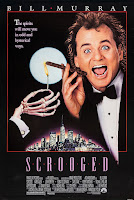Welcome to Awful Advent: a countdown of 13 Holiday Horror movies for the 13 days before Christmas
For this year’s final entry, it's the best version of the original holiday horror story, Scrooged!
Frank Cross, the youngest network president in history, is visited by 3 ghosts while he’s trying to oversee a live production of Dickens’ “A Christmas Carol.”
It’s Bill Murray in Richard Donner’s Scrooged! I don’t need to tell you what it’s about. This needs less explanation and summary than Gremlins. It’s “A Christmas Carol” transposed to the 80s and in a very novel way. We’ve seen the Christmas Carol format get used in all sorts of TV shows as well as countless straight adaptations, but, as far as I know, this is the only one that is an adaptation that has within it an adaptation of “A Christmas Carol.”
I first saw this movie on TV in 1992 the week my family got our dog. She was a Dalmatian puppy that I stumbled across while at school. The breeder had her in a little red wagon and, since my mom was coming to pick me up and I knew she liked puppies, I went to find her to show her the dog. When she saw her, my mom said, “All right, we’ll get you the dog.”
Which had not been my intent. I just wanted to show my mom a puppy because she liked puppies and now I had a decade's worth of responsibility ahead of me.
Regardless, she became my dog and lived with me and my family until she died in my arms, twelve years later, from kidney failure the morning she was scheduled to go to the vet to be put down.
That first weekend, when watching Scrooged, we had a massive snow storm and were alternating between watching the movie and watching the snow accumulate outside the patio doors. Inevitably, the dog had to go out so, rather than attach her lead as we normally would, we just let her run out into the snow. She ran to the edge of the half-buried deck and then *poofed* into the snow bank that had grown against it. Then we saw her deleriously hopping out of the snow only to fall and be consumed by another drift.
I don’t actually like Christmas. Much like Charlie Brown, I never feel the way I’m “supposed” to feel, something well-articulated by Leon Thomas of Renegade Cut. But when I think of what Christmas could be, the feeling I’m wanting from the holidays, it’s that quiet coziness and the ephemeral moment that you can’t recognize as special until after the fact.
Scrooged is, even without that memory, a good movie. It’s a melodramatic horror comedy that manages to hit all the notes. Yes, the jokes are funny and the ghosts—especially the arrival of the Ghost of Christmas Future—are scary. More notable, though, is how successfully it handles Frank's emotional arc. Murray was anxious that the story wouldn’t be believable. Not only would this massive scumbag be transformed by the events of the day but that the audience would believe in that transformation. What makes it work, the reason his absolution is possible is that he doesn’t change. He’s instead reminded of who he is.
When you look at his experience with the spirits, he doesn’t get shocked by anything. Instead he’s reminded that what happened to him wasn’t okay (Past), that what’s happening just outside his purview is not what he wants (Present), and that his actions are leading to consequences he couldn’t anticipate (Future). His breakdown/monologue at the end is emotionally affecting, but I’d argue the bigger moment is when the Ghost of Christmas Present leaves him in the sewer with Herman’s frozen body.
Frank was indifferent to Herman at the shelter, actively annoyed even, but didn’t want harm to come to him. Finding him there, saying, “Jesus, give me a happy ending here, Herm, c’mon man,” is the reality of Frank coming out, the moment it’s clear that he doesn’t want things to be as they are. He still needs the third spirit to push him into recognizing that he can do something about it. It’s also a real turning point in the movie. The jokes fall off a bit from that point. Yes, there are still gags and the sequence with Bobcat Goldthwait is very funny, but Frank stops being so quippy. That’s the moment he starts taking all of this seriously.
I love this movie. It’s one of my favorite movies—not just favorite Christmas or holiday horror—straight-up favorite movies. And I never even dove into how the original story is itself a holiday horror story, that the arguably quintessential Christmas story is itself a ghost story.
The movie’s great, it’s amazing, never stop watching it.
5/5 raspberries blown on bellies
Scrooged is available for purchase or rental from various online services.






